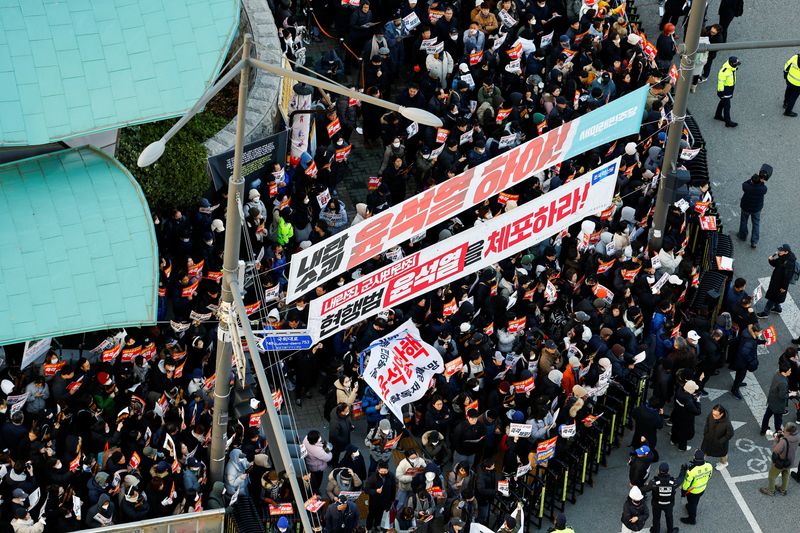Select Language

Fixes slug, no change to text)
By Hyunjoo Jin, Lisa Barrington and Heekyong Yang
SEOUL (Reuters) -From plastic surgery clinics to tour firms and hotel chains, South Korea's hospitality sector is wary of the potential impact of a protracted political crisis, as some overseas travellers cancel trips following last week's brief bout of martial law.
South Korea's travel and tourism industry, which generated 84.7 trillion won ($59.1 billion) in 2023, around 3.8% of GDP, has held up through previous bumps in the road, including a 2016 presidential impeachment and periodic tensions with North Korea.
But more than a dozen hospitality and administrative sources said the army's involvement in the latest political crisis was a serious development that could deter leisure and business travel, when the sector is approaching a full recovery in visitor numbers, which stood at 97% of pre-COVID levels as of October.
"There are concerns that safety issues in Seoul would throw cold water on the tourism industry," Seoul mayor Oh Se-hoon said on Wednesday while meeting tourism industry officials to discuss a fall in travel demand.
"There is a growing number of examples of foreign tourists cancelling visits to Seoul and shortening their stays," Oh said, before declaring "Seoul is safe", in English, Chinese and Japanese to the media.
Daily life and tourist activities have continued as usual, despite ongoing large protests, since President Yoon Suk Yeol rescinded his six hours of martial law on Dec. 4 after parliament voted it down, with analysts noting that South Korea's institutional checks and balances seem to be holding up.
Some tourists have since cancelled bookings, albeit not in great numbers, while others are enquiring whether they could pull out should the situation change, travel and hospitality sources said.
Accor (EPA:ACCP) hotel group, which includes the Fairmont and Sofitel brands, said it noted a "slight increase" in cancellation rates since Dec. 3, around 5% higher than in November.
The Korea Tourism Start-up Association said on Friday bookings for the first half of 2025 had already seen a sharp decline.
Rooms in previously fully-booked hotels in the capital Seoul have become available due to cancellations with some hotels "even lowering their rates and offering special deals to attract more bookings", said an inbound travel agency that asked not to be named due to the sensitivity of the matter.
A plastic surgery clinic in Seoul's upmarket Gangnam neighbourhood also said some foreign patients had cancelled visits since the martial law incident.
"We are not worried now, but if this situation continues, that would have an impact on foreign visitors," a clinic representative said, declining to be named.
South Korea is a top global destination for medical and plastic surgery tourism.
SOFT POWER
The latest political crisis also threatens to deal a major blow to the country's brand, which has been improving thanks to Korean culture and economic success, said Kim Wou-kyung, head of a government brand promotion agency.
The explosion to global prominence of South Korean drama, music and beauty, known as the "Korean Wave", plus a reputation for safety and global brands such as Samsung (KS:005930), are key forms of soft power that the government leverages to grow tourist numbers.
South Korea hopes to almost double the number of annual tourists by 2027 from 2019 levels to 30 million.
Part of the strategy is also to focus on group business travel for events including conferences and exhibitions, a sector known as MICE tourism, which could be impacted if the political crisis continues into early next year, said Ha Hong-kook, secretary-general at Korea MICE Association.
The parliament plans to vote on a motion to impeach Yoon on Saturday, a week after its first impeachment vote was defeated.
"If we get through this immediate, unprecedented period ... into a clear route to new elections, then I think actually the impact won't be that bad," said Andrew Gilholm, Director at risk consultancy Control Risks Group.
He said the country's reputation "might even be improved" long-term by displaying how it comes through the problems.
Su Shu, founder of Chinese firm Moment Travel in Chengdu, is also sanguine about travel demand for South Korea.
"No matter where there is chaos, there will be people who dare not go," Su said.
China is the largest source of foreign visitors to South Korea, followed by Japan and the U.S.
($1 = 1,433.0700 won)

